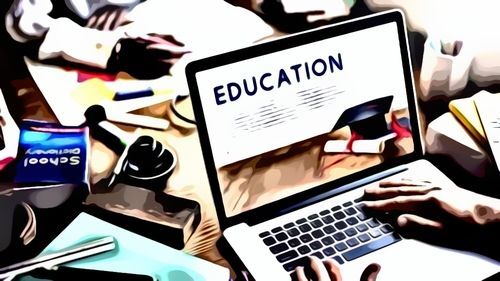IELTS Topic: Education

Vocabulary/ Expressions
Scholarship | (noun) – a sum of money or other aid granted to a student, because of merit, need, etc., to pursue his or her studies I received a scholarship to study in London | |||||||||||||||||||||||||||||||||||||||
Higher education | (noun) – education at a college or university where subjects are studied at an advanced level I have applied to a higher education institution to study further for my masters degree. | |||||||||||||||||||||||||||||||||||||||
Tuition | (noun) – the fee paid for an education. especially at a private school or university The tuition fees were very expensive. | |||||||||||||||||||||||||||||||||||||||
Student loan | (noun)– money given to a student by a bank or other financial institution to pay for school tuition; must be paid back I had to take out a student loan at the bank to pay for my studies abroad. | |||||||||||||||||||||||||||||||||||||||
Final exams | (noun)– the tests that are taken at the end of a semester or school year I am currently studying for my final exam next month. | |||||||||||||||||||||||||||||||||||||||
Semester break | (noun) – the time between the school periods were students don’t have classes After the final exam there will be a semester break. | |||||||||||||||||||||||||||||||||||||||
an online course | (noun) – a set of classes about a specific subject online I usually take online Language Classes. | |||||||||||||||||||||||||||||||||||||||
Intensive | (adj) – involving a lot of effort and activity in a short period of time They had to study intensively for the exam. | |||||||||||||||||||||||||||||||||||||||
to skip class | (idiom) – to not go to school or a class when you should It is not a good idea to skip class. | |||||||||||||||||||||||||||||||||||||||
to hit the books | (idiom) – to begin to study hard I will have to go home early from the party to hit the books for the exam tomorrow. | |||||||||||||||||||||||||||||||||||||||
PART 1 QUESTIONS
Introduction and interview (4-5 minutes)
Here are possible questions that might come up during the test. Go over them with your tutor.
In the first part, the examiner will ask you a number of general questions
What kind of school did you go to as a child?
Did you enjoy your time at school?
Would you say you were a good student?
Who was your favorite teacher?
Did you do any extra-curricular activities?
Do/did you go to a small or big university?
What do you study/did you study at university?
What is special about this subject?
What’s your university/college like?
Do you want to further your education?
Are schools, Universities, and colleges free in your country, or must you pay for Education
Is it important to obtain a bachelor’s degree in your country?
At what age do children begin school in your country?
PART 2 QUESTIONS
Individual long turn (3-4 minutes)
Here are possible questions that might come up during the test. Go over them with your tutor.
You will have 1 minute to prepare to speak, and then you will talk for 2 minutes, during which the examiner will not speak.
Part 2 – sample task card
Sample A
Describe a subject you enjoyed studying at school.
You should say:
When and where you started studying it
What lessons were like
What made the subject different from other subjects
and explain why you enjoyed the subject
Sample B
Describe a course you want to take.
You should say:
what course it is
when you want to take it
where you can take it
and explain why you want to take it.
Sample C
Describe a teacher who had a positive influence on you.
You should say:
what subject this teacher teaches/taught
how long he/she was your teacher
what positive characteristics this teacher has
and why you remember this teacher.
PART 3 QUESTIONS
Two-way discussion (4-5 minutes)
Here are possible questions that might come up during the test. Go over them with your tutor.
In the last part, you will talk with the examiner about issues related to the topic on the card.
1. What makes a good student?
2. What role / importance should the teacher have in the classroom?
3. Do you think computers will one day replace teachers in the classroom?
4. How has teaching changed in your country in the last few decades?
5. What is the difference between the way children learn and the way adults learn?
6. How can a teacher make lessons for children more interesting?

